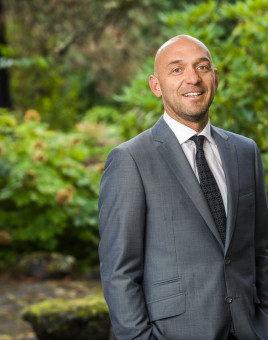
Joel Martinez
Department Chair of Philosophy and Associate Professor of Philosophy
“My aim in teaching is to express to the students how puzzling and interesting the everyday world is. We talk about morality, the external world, social institutions and other minds every day. However, philosophical reflection shows us that when we use these everyday ideas we do so in ways that are loaded with assumptions and involve commitments or implications we do not always notice. Philosophy is practical, important, and also just plain interesting.”
I study the history of moral philosophy as well as contemporary moral theory. My work focuses on moral decision-making and moral theory. I argue that reasoning about who we aim to be and what lives we aim to live are effective ways to make practical decisions. In addition, I do not think there is a useful or accurate distinction between theory & practice. One need not have a PhD in Philosophy to engage in deep philosophical reflection about morality. Similarly, in my view, abstract theorizing about morality is, and ought to be, a practical endeavor.
Most of my research has focused on the development of Virtue Ethics and Moral Psychology. I am now studying moral decision-making and Artificial Intelligence. I am also studying and developing courses in Latin American Philosophy. I think this is an exciting time to research and teach Philosophy.
My publications have appeared in The Australasian Journal of Philosophy, Apeiron, Boston Area Colloquium in Ancient Philosophy, An Anthology of Philosophical Studies (ATINER), Journal of Ethics, Philosophy and Global Affairs, among others.
I am honored to have received the 2010 Arnold L. and Lois S. Graves Award, administered by Pomona College and the American Council of Learned Societies.
During my free time, I like to hike with my dog in the forests surrounding Portland.
Academic Credentials
PhD 2006 University of Arizona
MA 1999 Michigan State University
BA 1997 New Mexico State University
Teaching
Spring 2024 Courses:
PHIL 201: Philosophy of Religion
TTH 9:40AM - 11:10AM
Issues in classical and contemporary philosophical examinations of religion such as arguments for the existence of God, religious experience, religious faith, the problem of evil.
Prerequisites: None.
PHIL 314: Ethical Theory
TTH 11:30AM - 1:00PM
The main systematic approaches to issues in moral philosophy. Meta-ethics: meaning of moral terms, relativism, subjectivism, ethics and science, social contract theory. Normative ethics: deontological duties, utilitarianism, virtue and character, egoism, rights, natural law, justice, blameworthiness, excuses.
Prerequisites: PHIL 102 or PHIL 103 and PHIL 250.
Professional Experience
I am honored to have received the 2010 Arnold L. and Lois S. Graves Award, administered by Pomona College and the American Council of Learned Societies.
Location: J.R. Howard Hall
Philosophy is located in room 2nd Floor of John R. Howard Hall on the Undergraduate Campus.
MSC: 45
email phil@lclark.edu
voice 503-768-7450
Chair Joel Martizez
Philosophy
Lewis & Clark
615 S. Palatine Hill Road MSC 45
Portland OR 97219